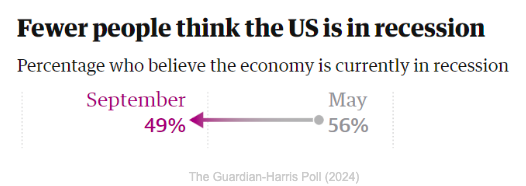Brief • 5 min Read
Economic Woes, Voting For Crypto, Developing Workers, and Medicare Misery
The latest trends in society and culture from The Harris Poll
Good afternoon from Aspen. Yesterday, CEO John Gerzema and CSO Libby Rodney took the stage at the 20th annual Forbes CMO Summit to present a talk on turning societal signals into marketing action. Things are hectic here, so more details next week.
This week, we have four new stories:
- First, Americans remain sour on the economy in our new poll with The Guardian. But this time, they are better on their finances.
- Next, we examine the role crypto is playing in the upcoming election with Grayscale.
- Then, with Bright Horizons, workers want more development from their employers.
- Lastly, Medicare isn’t an afterthought but a source of anxiety for many Americans in our latest research with Nationwide.
Crying Wolf On The Economy: The Guardian-Harris Poll
Across the board, Americans still seem to be down about the economy – negativity that has persisted since Harris Poll and the Guardian first asked voters their thoughts about the economy last September and again in May.
- Americans are still feeling sour: When asked how they think about the U.S. economy now, compared with the start of the summer, (35%) of respondents said they were more pessimistic (v. optimistic: 29%; the same: 36%).
- It’s a recession to me: Nearly three-quarters (73%) said they don’t feel any positive effects of good economic news today.
- This leaves them to fail on economic facts: (61%) believe inflation is increasing (it’s fallen), and (49%) believe the U.S. economy is in a recession (it’s not).

- Yet, it’s not all dire when you get personal: Compared with May, more Americans indicated they were confident in their overall personal finances (61%) and ability to afford necessities (72%).
Takeaway: Since the last poll in May, the economy has improved across several key measures. Inflation fell to 2.5% in August, the lowest since 2021, and has been going down for the last five months. Though some anemic job growth reports have been reported, unemployment is still relatively low at 4.2%. The stock market hit record highs in September. All of this is despite the decades-high interest rates, which the U.S. Federal Reserve only started to cut this month.
Voting On Crypto: Grayscale-Harris Poll
The economy may be on the minds of the majority of voters. Still, crypto has become increasingly important this year on the ballot for a growing number, as shown in our latest collaboration with Grayscale, covered by CoinDesk.
- Don’t ignore crypto this November: As Americans approach the U.S. election, more than half of voters (56%) are more likely to vote for a candidate who is” informed about crypto” compared to one who is not (an 8%-pt increase from Dec. 2023).
- Similarly, two in five (40%) voters now say they are “paying attention to candidates” positions on Bitcoin and other crypto assets in this election compared to all other previous polls, “a sentiment that has steadily risen (+6%-pts).
- Is there a better party for crypto? Among crypto-owning voters, just under half (45%) believe the Democratic party has more favorable positions supporting crypto, while (42%) say the Republican party.
Takeaway: “Crypto has certainly become a topic of discussion in the 2024 U.S. election. Voters increasingly indicate they own Bitcoin, or may own crypto in the future, and want to support future-forward political candidates interested in learning about crypto as an investment and emerging technology,” said Craig Salm, Grayscale’s Chief Legal Officer.” Our data reinforces that crypto transcends political party affiliations and can be a uniquely unifying issue in American politics.”
Career Mobility Matters: EdAssist by Bright Horizons-Harris Poll
In our newest research with EdAssist Bright Horizons featured in Forbes, we find that career development is a critical factor in retaining and attracting talent and a vital way for companies to invest in their employees.
- Workers want more: Nearly three-quarters (74%) want to develop new skills or pursue additional education.
- Yet, about three in five (58%) don’t know where to start.
- Even though more than a quarter (26%) feel more pressure to learn new workplace skills due to A.I., and (30%) worry that A.I. will replace their job.
- Calling on employers: Just over half (52%) of workers believe it’s their employer’s responsibility to guide them.
Takeaway: “To help lessen employee burden, companies must provide the right benefits that address education barriers head-on. This can result in a more loyal workforce and boost a business’s bottom line by helping attract and retain top talent,” said Diane Bartoli, Senior Vice President of EdAssist by Bright Horizons.”Forward-thinking companies that make education investments that simultaneously enable employees to learn and advance will find themselves winning both the talent war and the reskilling revolution while building a workforce ready for the future.”
Medicare’s Moment: Nationwide-Harris Poll
With Harris’s recent announcement proposing Medicare pay for home health care for the first time, our recent study with Nationwide on Medicare was aptly timed, given Americans’ increasing concern about the program’s future.
- Running out of time: Nearly two-thirds (63%) fear the Medicare program won’t be there when they need it, while (67%) worry a single significant healthcare issue could ruin their finances for years to come.
- Further, when asked about their most significant retirement planning stressor, one in five (20%) selected Medicare running out of money.
- Medicare’s on the ballot: When thinking about the presidential election, (42%) said the top healthcare priority for the next administration should be ensuring Medicare’s stability, just behind lowering out-of-pocket healthcare costs and prescription drug prices (43%).
- Medicare has some bipartisan support for the next administration: (47%) Democrats and (43%) Republicans want the next administration to prioritize Medicare’s stability.
Takeaway: “Concerns about the future of Medicare are adding another layer of uncertainty for Americans as they consider how they’ll manage health care costs in retirement,” said Kristi Martin Rodriguez, senior vice president of the Nationwide Retirement Institute.”With high living costs already squeezing household budgets, many are worried about having enough saved to cover their long-term health care. Given the current pressures and potential for future health care cost increases, it is never too early to begin planning for health care expenses in retirement.”
Subscribe for more Insights
Subscribe to our newsletter for the latest trends in business, politics, culture, and more.
Related Content








